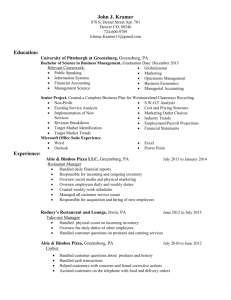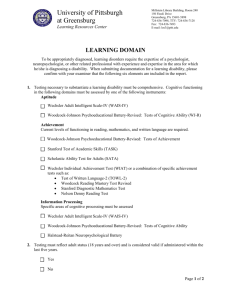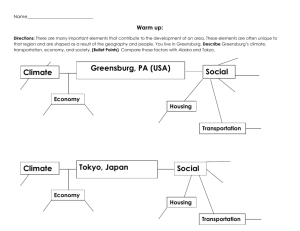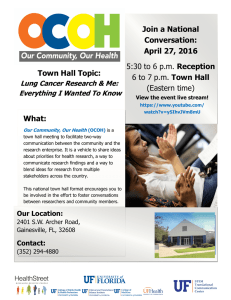. .. ftomthe past 8B
advertisement
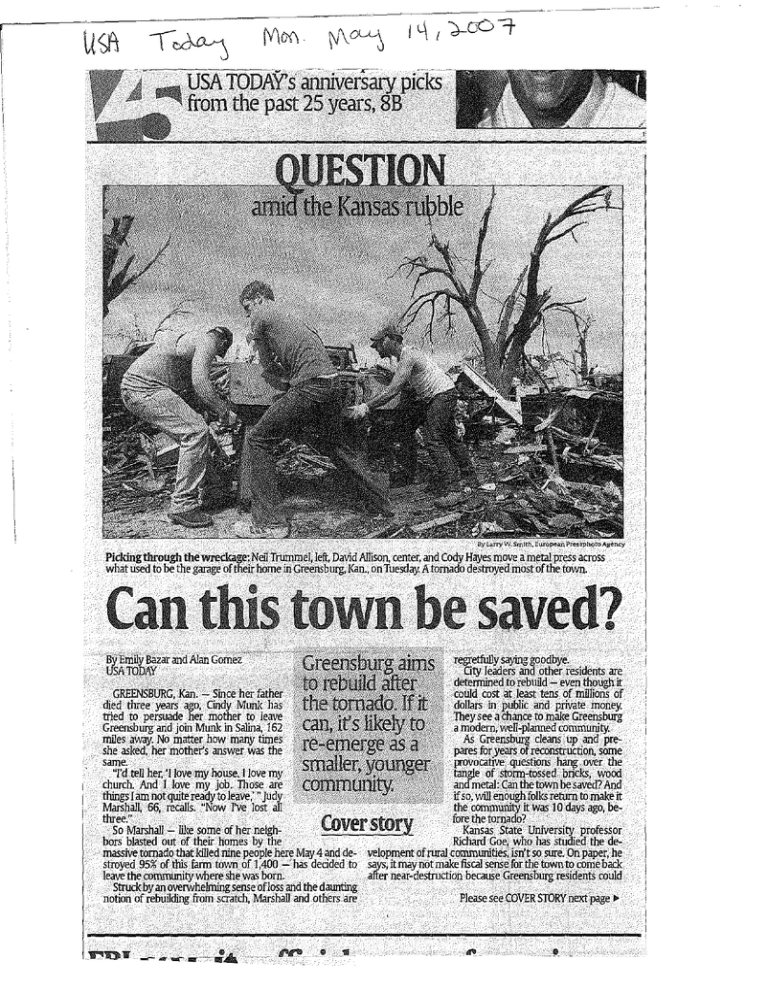
fY\CX\ .
. -~ . USATOPAY's.~yersacypicks
~ ftomthe
past 25y~ars, 8B
Picking through fl\e wrec:kage:Neil Trumm el, left, David Allison, center, and Cody Hayes move am~ press across
what used to be the garage of their home in (:;reensburg,Kan., on Tuesday. Atornado destroyed most of tlie town.
Canthist nbes.aved7
. ByErriily!lazar and Aian
regretfuilJ' ;il)'ing goodby~,
City leaders and othenesidents are
determined.to rebuild - even though it
GREENSB\JRG,Kan. - Since her father
could cost at]east tens. of.millions of
died three years ago, Cindy Munl< has
dollars in pUbfic and. private money.
tried to persuade her mother to leave
.They see .a Chance to make Greensburg
Greensburg and join Munk in Salina, 162
a modern, well-planned community.
miles away. No matter how many times
As Greensqurg cleans up and preshe asked, her mother's answer was the
pares for years of reconstruction, some
same.
provocative questions hang over the
"I'd tell her, 'I love my house. I love my
tangle of .storm-tossed .bricks, wood
church. And .1 love my job .. Those are
and metal: Can the to.wn be saved? And
things I am not quite ready to leave,' "Judy
if so, will enough folks return to make it
Marshall, 66; recalls. "Now I've lost all
the community it Was 10 days ago, bethree."
fore the tornado?
·
Kansas State University professor
So Marshall - like some of her neighbors blasted out of their homes by the
Richard Goe, who has Studied the demassive tornado thatldlled nine people here May 4 and de- velopment ofrural communities, isn't so sure. On paper, he
stroyed .95% of this farm town. of 1,400 -·has decided to says, it may not make fiscal sense for the town to. come back
leave the communitywbere she was born.
after near-destruction because. Greensburg residents could
Struck by an overwhelming sense ofloss and the daunting
Please see COVER .STORY next page ,.
notion of rebuildiog from scratch, Marshall and others are
USA TODAY
\•/
.Coverstoni:
_,_
was nume ro a 1nearer, oaru<s, a
drugstore and other businesses,
many of them catering to the
town's elderly population.
lf many elderly residents follow
Marshall's lead and move elsewhere to be closer to relatives,
Cover story'
medical care or other necessities
rather than begin an arduous rebuilding process, fewer businesses
would be likely to survive.
Greensburg City Administrator
Steve Hewitt acknowledges such
challenges but says many other factors are in Greensburg's favor. For
one, it's the county seat of Kiowa
County, so state and local government has an interest in the town
remaining vibrant
Beyond that, Hewitt says,
"there's_ history here. There are
families that go back five or six generations. You can't put a price on
small towns."
Goe agrees that money isn't the
only tactor in the debate over rebuilding and that the strong emotional and family ties small-town
residents often have to their communities are not easily broken. He
says he expects Greensburg to
eventually re-em~rge as a smaller
town, with a younger population.
For now, Hewitt and other town
officials count on residents whose
outlook is like that of Alan Todd, 37.
Todd says he won't leave Greensburg, even though his house was
destroyed by the tornado. He's
staying at a farm a few miles north
of town.
Todd says that he's the fourth
generation in his family to live in
the county and that he appreciates
the town's neighborly lifestyle.
"By God, there's going to be
Todds in this county for a long time.
So, hell yes, we're rebuilding," he
says. "We've been through
droughts and blizzards. This is another complication in the road."
Agriculture jobs decline
Greensburg traces its origins to
homesteaders and settlers who
sought land to fann and ranch.
Originally a stagecoach stop, it
became a railroad town in 1887,
when work began on a well for the
water needed by steam locomotives. 'That big well is still here,"
Hewitt says.
In fact, "the world's largest handdug well," at 109 feet deep and 32
feet wide, is one of the main attractions in Greensburg, which is 109
miles west of Wichita.
Together with a 1,000-pound
meteorite that was found nearby,
the well attracts 30,000-35,000
tourists a year, says Don Stimpson,
)
34, wno wor!<:; at t11e visitors center for the well and meteorite. Both
attractions survived the tornado;
the visitor's center did not.
Before the tornado hit, oil, gas
and trucking provided some jobs,
but agriculture was king, says Mayor Lonnie McCollum, 61. Even so,
agriculture - primarily corn,
wheat, soybeans and milo -wasn't
providing the economic boost it
had in previous generations.
Greensburg's ·population had
fallen steadily for decades, reflecting a trend in many small fanning
towns in Kansas, says David Burress, director of the Ad Astra Institute, a Kansas public policy think
tank. Automation and advances in
farming technology led to less and
less work for area residents;
"By and large, they don't have
much of an economic base to keep
them there," Burress says.
Now, there's hardly an economic
base at all.
The impact of the tornado that
packed wmds up to 205 mph was
stag_~ering: 961 single-family
dwellings were destroyed, and 105
had major damage, says Angee
Morgan of ·the Kansas Division of
·Emergency Management. Among
businesses, 110 suffered heavy
damage and 24 had minor damage,
she says.
The devastation hasn't dissuaded
local officials, who say they're committed to rebuilding and are taking
the first critical step: struggling to
bring utilities such as water and
power back in service. "You have
the opportunity to have a brandnew town," McCollum says. 'Why
not take it? Why not?"
The mode! for local officials is unlike]y to be the Gulf Coast areas
overrun by Hurricane Katrina two
years ago; the scope and complexity of that disaster is far beyond
what happened here.
The more likely models for
Greensburg are other small communities that dloseto rebuild after
being wrecked by natural disasters,
says Federal Emergency Management Agency regional administrator Dick Hairtje.
He notes that towns rebuilt virtually from scratch often don't take
the same funn. Hainje cites Spencer, S.D., a small town flattened by a
tornado in 1998, as an example.
The town rebuilt, "but not everybody came back," he says. "It was
an elderly population, and there
were Very few jobs."
Rebuilding is more taxing on elderly residents, Hainje says.
'They're very capable, but making
an adjustment ]il{e this is difficult."
Assuming Greensburg comes
bade, Joseph Aistrup, head of the
political science department at
Kansas State University, foresees a
drop in Greensburg's population,
moved in, bringiaj the t6wil
back to its pre-tornado population of just less than 300.
Sixty homes have been built,
all the businesses have reopened
By Emily 11.a2.>c, US.._ TOD.._Y
Committed to rebuilding: Debbie Boyles, 52, deans the last Tangle, her
beauty shop and tanning salon on Main Street in Greensburg.
particularly among the elderly.
"There is going to be some population drain," he says. "Even under
the best of circumstances, some of
these older folks who do need
medical care dose by will be relocated."
Doug Harrell, 84, a retired funner and home builder, says he'll
probably move in with his son, who
lives 8 miles from town.
"I will not rebuild because of my
age," says Harrell, whose home was
destroyed. "I would if I were much
younger."
longer
Greensburg
Milliehave
and family
Virgil in
Rush,
who no
and no longer have a home, are
considering moving to the larger
city of Pratt, about 30 miles away.
"Our doctors are there," says Millie,
72. "Someday, we won't have
someone to drive us out to the doctor."
Hewitt says he sympathizes with
the special challenges elderly residents face.
"A lot of people won't be able to
stay. We uo.derstand that," Hewitt
says. "But a lot of people want to
stay."
'A need for me to be here'
Hewitt and other leaders have
ambitious plans for Greensburg. He
says he'd like to make it a leader in
environmentally sensitive design,
and envisions green spaces, new
schools and a new hospital.
The price tag will be high. The
preliminary estimate for rebuilding
the citf.s utilij:ies alone is at least
$50 million, Hewitt says.
The funds to rebuild will come
from a variety of public and private
sources. Insurance money will be
the first pot tapped, says Steve Castaner, long-tenn community recovery specialist for FEMA.
The remain:::ler will Come from
FEMA's Public Assistance Grant
Program, other federal funds, state
and local money and even private
donations, Castaner says.
people of Greensburg, "Do not
expect mitades. 1rS not going to
happen overnight."
By Alan Gomez
Currently, Greensburg farmers
simply harvest crops and move
them out of town, he says. The city
1 can create jobS by processing those
~ products in-town at cotton mills,
ethanol production pla'nts and elsewhere.
"If there's no jobs, where do
people go?" Kelly Estes asks. "If residents get money for their houses,
they're going" to leave.
Marshall: MovDebbie Boyles, 52, hopes to offer
ing away.
jobs as soon as she's able. The
Greensburg resident has owned
uit's an opportunity to rebuild a the last Tangle, a beauty-shop and
rural community on the cutting tanning salon, since 1990.
edge," says Kansas Gov. Kathleen
Boyles was one of the lucky ones.
Sebelius, who says the city may Her house survived the storm. Her
consider innovations such as a mu- shop did not She says she feels a
nicipal wind farm.
responsibility to rebuild, even if it's
When President Bush toured the not in the same building on Main
region Wednesday, brothers Kelly Street
and Mike Estes told him the town
"I feel like there's a need for me
needs infrastructure and industry to be here and to offer a service,"
to survive. They run the BT! John she says as she picks up stray manDeere dealership in town, which nequin heads and hair rollers in her
suffered $23 million to $25 million shop. "I'm st<Wing."
in damage, Kelly Estes says.
Other business owners take a
They said the city's survival de- wait-and-see approach, including
pends on creating jobs quickly and Starla McOain, who owns Starla's
urged Bush to promote ethanol and Stitch 'n Frame.
biodiesel in the area, a natural comShe says her first choice is to replement to the communit:Ys agri- build, but she's also considering
cultural industry. they say.
moving her custom framing and
During his visit, Bush promised needlework shop to Pratt.
Greensburg residents "whatever
In part, she's waiting on her felheJp is appropriate."
low shopkeepers to announce their
The brothers say he was recep- intentions.
tive to their ideas and "perked up"
"A lot ofit depends on what othat their suggestions.
er businesses decide to do," she
"He was optimistic about etha- says. "I don't want to be the only
nol," Mike Estes says.
business on Main Street"
Aistrup also promotes the concept of "value added" agriculture. Comez reported from Mclean, Va
\iiiiiiiiiiiiiiiiiiiiiiiiiiiiiiiiiii
SOME STORIES
AKE YOU
SPEECHLESS
WHICH IS WHY WE
R..ll"'"'l"'"'n Tl"'\ TA.I
.IL,
I ,

